<> Lebadea martha (Fabricius,1787) <>
the Knight ผีเสื้อสะพายขาวปีกโค้ง
Click on any photo to see all photos full size in Lightbox
Additions and corrections to the information provided on this page is always welcome. Please use the Contact form.
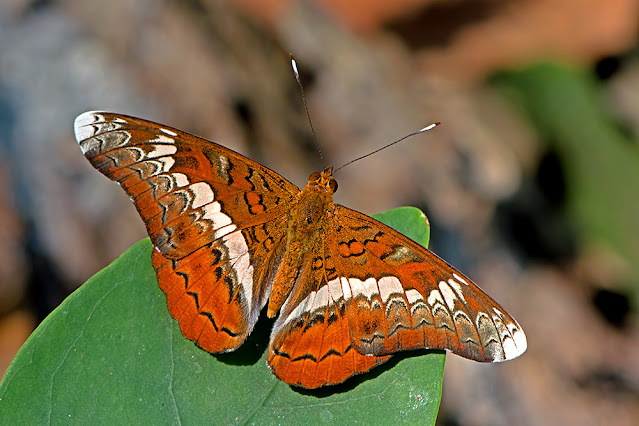
Photo taken at Doi Suthep-Pui National Park, Chiang Mai. Thailand ♂ 450m a.s.l.

Lebadea martha is common and is distributed throughout most of the region but is somewhat rarer in China and absent from Taiwan. Although generally common it can be quite localised in some areas. The species is sexually dimorphic but only mildly so. The female is slightly larger than the male and a little darker in colour but other differences in appearance are quite minimal. The easiest way to tell the difference is that the male has a distinct white patch at the apex of the forewing. It is essentially a forest species and a fast and strong flier.
This species is multivoltine with several broods per annum. The adult female lays her eggs singly at the leaf tip on the host plant. Once hatched the larva feeds on the lamina in a rather unusual and systematic manner. It makes cuts through the lamina from the edge of the leaf to the midrib, creating an isolated leaf fragment which it then devours. Once that has been exhausted it creates another one and eats it, then another, and continues in the same manner.
Synonyms and previously used names: Lebadea attenuata, Limenitis attenuata, Papilio martha
Taxonomy: Animalia - Arthropoda - Insecta - Lepidoptera - Nymphalidae - Limenitidinae - Lebadea - martha
Regional subspecies: L.m.martha (India, Myanmar, Thailand, Laos, Cambodia, Vietnam, S.China), L.m.malayana (S.Thailand, W.Malaysia), L.m.nebula (China,Yunnan), L.m.parkeri (Singapore), L.m.sumatrensis (Indonesia). There are also a few other subspecies scattered amongst the islands of Indonesia.
Regional Distribution: India, Nepal, Bhutan, Bangladesh, Myanmar, Thailand, Laos, Cambodia, Vietnam, China, Malaysia, Singapore, Indonesia, Philippines
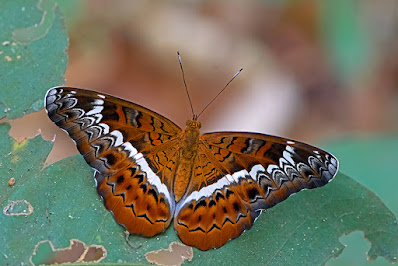 |
| Doi Suthep-Pui National Park, Chiang Mai, Thailand ♀ 460m a.s.l. |
Habitat: Lebadea martha is found in low to mid-elevation primary and disturbed montane forest, up to 1200m a.s.l. It is a shade-loving species but can often be seen basking in sunny spots within the forest.
Flight time: all year round, depending on location Wingspan: 50-65mm
Life History: egg 3-4 days instar 1 3-4 days instar 2 3-4 days instar 3 3-4 days instar 4 3-5 days instar 5 4-7 days pupa 7-8 days Total egg to adult 26-36 days. All times are approximate.
Larval Hosts: Ixora congesta, Ixora lucida, Ixora javanica (Rubiaceae), Mammea siamensis (Calophyllaceae), Acalypha wilkesiana (Euphorbiaceae), Ziziphus attopensis (Rhamnaceae). Actual host plant used depends upon location and availabilty of plant species.
Adult Food Sources: Nectar - although this species is reportedly fond of flowers there are no recorded instances of it actually feeding on nectar. Other - mud puddling, animal dung, over-ripe fruits
 |
| Doi Suthep-Pui National Park, Chiang Mai, Thailand ♂ |
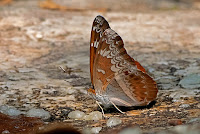 |
| Doi Suthep-Pui National Park, Chiang Mai, Thailand ♀ |
%20galleryNU.jpg) |
| Doi Suthep-Pui National Park, Chiang Mai, Thailand ♀ |
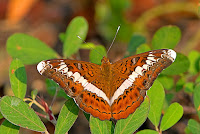 |
| Doi Suthep-Pui National Park, Chiang Mai, Thailand ♂ |
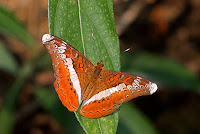 |
| Doi Suthep-Pui National Park, Chiang Mai, Thailand ♂ |
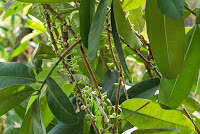 |
| Mammea siamensis, a larval host |
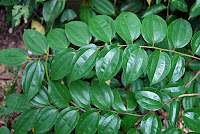 |
| Ziziphus attopensis, another larval host |
Links to other pages in this series for species in the same subfamily
Athyma perius
Auzakia danava
Euthalia alpheda
Euthalia lubentina
Lasippa viraja
Limenitis asura
Neptis cartica
Neptis miah
Pantoporia hordonia
Sumalia daraxa
Athyma pravara
Bhagadatta austenia
Euthalia anosia
Euthalia monina
Lebadea martha
Limenitis dudu
Neptis clinia
Neptis nashona
Pantoporia paraka
Sumalia zulema
Athyma ranga
Cynitia cocytus
Euthalia evelina
Euthalia patala
Lexias dirtea
Moduza procris
Neptis hylas
Neptis nata
Parthenos sylvia
Tanaecia jahnu
Athyma selenophora
Euthalia aconthea
Euthalia franciae
Euthalia phemius
Lexias pardalis
Neptis ananta
Neptis magadha
Neptis soma
Phaedyma columella
Tanaecia julii
